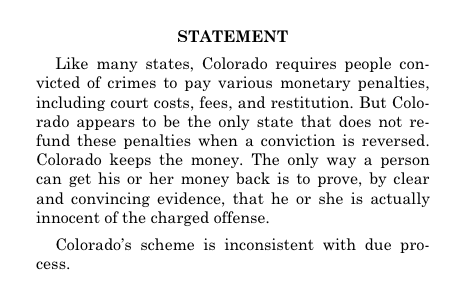On Monday, the United States Supreme Court considered whether Colorado is legally obligated to reimburse court fees and victims restitution paid by people whose convictions have later been overturned. The justices appeared to agree with the petitioners that the state should be paying back those who have been acquitted.
One of the petitioners, Shannon Nelson, was convicted of five counts of sexually abusing her children. An appeals court overturned the conviction based on faulty “expert” testimony presented to the jury. When Nelson was retried, a jury acquitted her. The second petitioner, Louis Alonzo Madden, was convicted of attempting to patronize a child victim of sex trafficking and attempted sexual assault. Both convictions were vacated due to the ineffective counsel Madden received from his attorney.
Both Nelson and Madden paid a number of court fees and victim restitution. Both asked for their money back after their convictions were dropped and they were freed. Madden was able to recover his court fees, but was denied his restitution payments. Nelson was blocked from any reimbursement of the more than $8,000 she paid in connection with her conviction.
Colorado is reportedly the only state that keeps defendants’ court fees and other fines after convictions are scrapped.
A CO appeals court ruled in favor of repayment, but the decision was reversed by the state supreme court, which ruled that the Nelson and Madden only had a right to compensation if they were fully exonerated by providing “clear and convincing evidence” of their innocence. Nelson and Madden were not going after the kind of per diem compensation awarded to exonerees, however. The two sought to recover the money they paid following their invalidated convictions.
On Monday, a majority of the justices seemed be in agreement that Colorado cannot put the burden on defendants to prove their innocence before they are reimbursed their fees and fines. “It seems as though the obligation on the state’s part is immediately to put a check in the mail,” said Justice Elena Kagan.
The Atlantic’s Garrett Epps has more on the issue before the high court.

